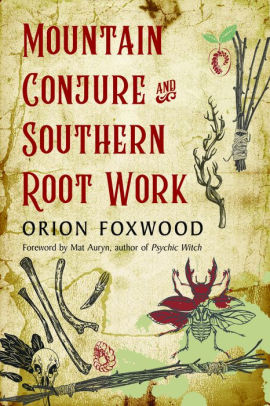First published in 2012 under the title The Candle and the Crossroads: A book of Appalachian Conjure and Southern Root Work, this edition has a new foreward by Mat Auryn. I have both the original and the new version and didn’t realize they were the same book at first but I recognized the writing. I laid them side by side to check. Memory is a funny thing and I suggest if you have read it before that it is worth reading again. Reading it a second time through I still love it. This book was my introduction to hoodoo. For me, it will always hold a special place on my bookshelf.
Many hoodoo books on the market read like instruction manuals. Do this and magic happens! They don’t tell you the missing ingredient-the power of Spirit. Many hoodoo practices are based on Biblical psalms. Mountain Conjure has less of this than other books perhaps because the author is also an elder and high priest in pagan Craft traditions. He is still comfortable with the Pentecostal Christian practices he was raised with and I think would have to be to fully embrace southern root work. It is a folk magic practice, not a religion, but the influence of Christianity is embedded in the practice. What I find enduring about Foxwood’s writing is his focus on the Spirit. Root doctoring is a spiritual healing practice. For it to work, you got to have faith. The root doctor is a mere conduit for the Spirit. Foxwood writes about spiritual connection with power and poetry. He brings this so often missing element to the forefront.
First the groundwork for understanding and connecting to Spirit, spirits and the ancestors is laid. Hoodoo is a tradition that crosses America’s racial and spiritual lines. In a country where most modern Christians do not acknowledge the magic of Solomon, it is a largely Christian based folk magic. In a country struggling to this day with racial oppression, root work’s roots tap into the magic and herbal lore of African slaves, European immigrants and indigenous southern tribes. This tradition requires respect for all of these ancestors. Foxwood speaks of this history, these ancestors with respect.
Methods for diagnosing spiritual ailments and methods for spiritual healing are described in detail. Some of his categories are ones that he has invented to aid in teaching and I do think they are useful. Much attention is focused on graveyard work. This bears a lot of explanation because it is a spiritual practice that is likely not known nor understood widely outside of its cultural context. The reader will understand what it consists of and how to respectfully enter into this practice. In essence, it is a practice of connecting with the spirits of the dead who may assist you, if they wish, with the problems of your life. Hoodoo also connects with some legendary spirits, such as the Dark Rider. Foxwood introduces the practice of seeking the Dark Rider at the crossroads but discusses why you may not wish to and stops short of providing instructions for advanced workings.
Mountain Conjure and Southern Root Work is a very personal book about the traditions learned by one rootworker from his family in the Shenandoah Valley. It certainly is not the only way to practice conjure but it is the most personal, emotionally affecting, stirring writing I have found so far. Foxwood’s writing on the ethics of hoodoo is rare and invaluable in such an oldy worldy folksy way. There is a strong emphasis on knowing yourself and being true to spirit but in a language that is from a simpler, different time.
This book does more than tell you spells. It gets to the heart of matters. It worries about your soul. It tells you how to come clean. It tells you how to go deeper into your roots. It takes the practice of spiritual doctoring seriously.
Highly recommended.
~review by Elsie Smyte
Author: Orion Foxwood
Publisher: Weiser Books
pp. 234 , $18.95
Mountain Conjure and Southern Root Work

©
2010 - 2025
Facing North
